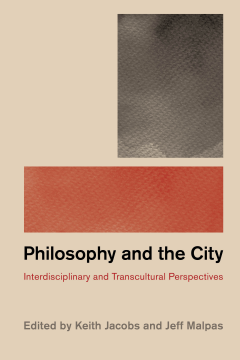
Additional Information
Book Details
Abstract
Philosophy has its origins in the city, and in the context of our own highly urbanised modes of living, the relationship between philosophy and the city is more important than ever. The city is the place in which most humans now play out their lives, and the place that determines much of the cultural, social, economic, and political life of the contemporary world. Towards a Philosophy of the City explores a wide range of approaches and perspectives in a way that is true to the city’s complex and dynamic character. The volume begins with a comprehensive introduction that identifies the key themes and then moves through four parts, examining the concept of the city itself, its varying histories and experiences, the character of the landscapes that belong to the city, and finally the impact of new technologies for the future of city spaces. Each section takes up aspects of the thinking of the city as it develops in relation to particular problems, contexts, and sometimes as exemplified in particular cities. This volume provides an invaluable resource for students and scholars in Philosophy, Geography, Sociology and Urban Studies.
While philosophy might have begun in the city, this volume asks the more unusual question of what it means to think philosophically about the city – the concepts it enfolds, the modes of life and existence it allows, the histories and future possibilities it engages. Expansive and incisive, this excellent volume situates the city at the centre of our critical and creative reflections.
Jessica Dubow, Reader in Cultural Geography, University of Sheffield
Cities are the most complex of all human inventions. They contain, reveal, and amplify all the challenges and possibilities of existence. Cities have also been where most philosophical discourse has actually happened, yet philosophers have unfailingly chosen to ignore them. Philosophy and the City is the first substantial attempt to correct this remarkable omission and to explore the city as a philosophical subject.
Edward Relph, Professor Emeritus, University of Toronto
Keith Jacobs is Professor of Sociology at the University of Tasmania. His publications include: The Dynamics of Local Housing Policy (1999); Experience and Representation: Contemporary Perspectives on Migration in Australia (2011); and House, Home and Society (2016), co-authored with Rowland Atkinson.
Jeff Malpas is Distinguished Professor at the University of Tasmania and Visiting Distinguished Professor at Latrobe University. He was founder, and until 2005, Director, of the University of Tasmania’s Centre for Applied Philosophy and Ethics. His many publications include Heidegger and the Thinking of Place (2012), Heidegger's Topology (2006) and Place and Experience (2007).
Table of Contents
| Section Title | Page | Action | Price |
|---|---|---|---|
| Contents | v | ||
| Acknowledgements | vii | ||
| Introduction: On the Philosophy of the City | ix | ||
| Part I. CITY CONCEPTS: Places, Processes, Structures | 1 | ||
| Chapter 1. Capitalism, Form and the Philosophy of the Urban | 3 | ||
| Chapter 2. The Discourse of the City | 21 | ||
| Chapter 3. The City as Wild | 43 | ||
| Chapter 4. Urban Time and the City as Event | 51 | ||
| Chapter 5. The Immanent City | 67 | ||
| Part II. CITY LANDSCAPES: Experience, History, Identity | 81 | ||
| Chapter 6. Solar Le Corbusier | 83 | ||
| Chapter 7. Escaping Mediocrity: Renaissance Florence and the Rejection of the City | 103 | ||
| Chapter 8. Justice as the Urban Everyday | 117 | ||
| Chapter 9. Gardens, Cities and Timescapes in South Asia | 133 | ||
| Chapter 10. A Vertical Melbourne | 147 | ||
| Chapter 11. The City’s Other Face: Modern Ruins and Urban Endings | 165 | ||
| Part III. CITY FUTURES: Power, Risk, Value | 177 | ||
| Chapter 12. Beyond Differences of Race, Religion, Class: Making Urban Subjects | 179 | ||
| Chapter 13. Cities Remade: On Deciding the Fate of Building in the City | 191 | ||
| Chapter 14. The City as a Construct of Risk and Security | 205 | ||
| Chapter 15. Philosophies of Commensuration, Value and Worth in the Future City: Rethinking the Interdisciplinary | 217 | ||
| Chapter 16. Multiplying Resistance: The Power of the Urban in the Age of National Revanchism | 233 | ||
| Chapter 17. Urban Futures and The Dark Enlightenment: A Brief Guide for the Perplexed | 245 | ||
| Bibliography | 259 | ||
| Index | 287 | ||
| About the Contributors | 301 |
